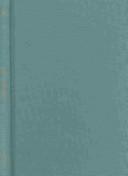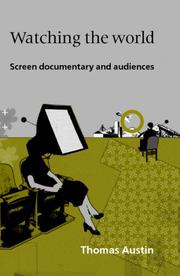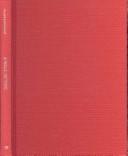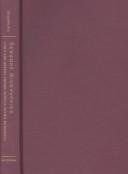| Listing 1 - 9 of 9 |
Sort by
|
Book
ISBN: 9048537088 9462985847 9789462985841 9789048537082 Year: 2018 Publisher: Amsterdam University Press
Abstract | Keywords | Export | Availability | Bookmark
 Loading...
Loading...Choose an application
- Reference Manager
- EndNote
- RefWorks (Direct export to RefWorks)
Stories are perceived as central to modern life. Not only in narrative entertainment media, such as television, cinema, theater, but also in social media. Telling/having "a story" is widely deemed essential, in business as well as in social life. Does this mark an intensification of what has always been part of human cultures; or has the realm of "story" expanded to dominate twenty-first century discourse? Addressing stories is an obvious priority for the Key Debates series, and Volume 7, edited by Ian Christie and Annie van den Oever, identifies new phenomena in this field -- complex narration, puzzle films, transmedia storytelling -- as well as new approaches to understanding these, within narratology and bio-cultural studies. Chapters on such extended television series as Twin Peaks, Game of Thrones and Dickensian explore distinctively new forms of screen storytelling in the digital age. With contributions by Vincent Amiel, Jan Baetens, Dominique Chateau, Ian Christie, John Ellis, Miklós Kiss, Eric de Kuyper, Sandra Laugier, Luke McKernan, Jose Moure, Roger Odin, Annie van den Oever, Melanie Schiller, Steven Willemsen, Robert Ziegler.
Storytelling in mass media. --- Mass media --- Screens --- surface --- depth --- seeing --- touching

ISBN: 1282762893 9786612762895 0520937112 9780520937116 6612762896 9781282762893 0520236238 9780520236233 0520238117 9780520238114 Year: 2003 Publisher: Berkeley : University of California Press,
Abstract | Keywords | Export | Availability | Bookmark
 Loading...
Loading...Choose an application
- Reference Manager
- EndNote
- RefWorks (Direct export to RefWorks)
Why/Why Not presents a speaker caught in quandaries created by changing perspectives, fervors, and locales. Why do we act one way here and another there; why can't a mind stay made up; why do we hate and love at the same time; why does memory fade or insist; why does the ordinary seem so uncanny? These questions are captured in lines that collide and merge, in irreverent and offhand jibes, and in plaintive repetitions.Why/Why Not moves across a vivid terrain-the stage of Hamlet, Phillip Marlowe's Los Angeles, Prague, paintings and gardens-to push through a tangle of ways to make sense of the world. Martha Ronk's poetic language is that of the everyday slightly skewed, as if pieces of an ordinary sentence were missing. Ronk's poems use the repetitive and the banal to explore ways in which language is intertwined with thought and experience.
American poetry --- american poets. --- beauty. --- changing perspectives. --- changing places. --- complex. --- contemporary poetry. --- exploration of language. --- famous poets. --- female speaker. --- hamlet. --- human experience. --- human thought. --- intellectual poetry. --- irreverent. --- literature students. --- los angeles. --- making sense. --- memory. --- narrative poetry. --- phillip marlowe. --- philosophy. --- poetic language. --- poetry collection. --- poetry. --- prague. --- questioning. --- realism. --- repetition. --- thought provoking. --- touching. --- women authors.

ISBN: 1781701776 1847794483 9781847794482 0719076897 0719085586 Year: 2007 Publisher: Manchester ; New York : Distributed in the USA by Palgrave, Manchester University Press ;
Abstract | Keywords | Export | Availability | Bookmark
 Loading...
Loading...Choose an application
- Reference Manager
- EndNote
- RefWorks (Direct export to RefWorks)
Screen documentary has experienced a marked rise in visibility and popularity in recent years. What are the reasons for the so-called 'boom' in documentaries at the cinema? How has television documentary met the challenge of new formats? And how do audiences engage with documentaries on screen? Watching the world extends the reach of documentary studies by investigating recent instances of screen documentary and the uses made of them by audiences. The book focuses on the interfaces between textual mechanisms, promotional tactics, and audiences' viewing strategies. Key topics of inquiry are: fi
Documentary films --- Documentary television programs --- Documentaries, Television --- Documentary programs, Television --- Telementaries --- Television documentaries --- Television documentary programs --- Documentary mass media --- Nonfiction television programs --- Documentaries, Motion picture --- Documentary videos --- Factual films --- Motion picture documentaries --- Moving-pictures, Documentary --- Nonfiction films --- Actualities (Motion pictures) --- History and criticism. --- Capturing the Friedmans. --- Etre et Avoir. --- Paradise Lost. --- Touching the Void. --- audiences. --- cinema. --- documentaries. --- promotional tactics. --- textual mechanisms. --- viewing strategies.
Book
ISBN: 1283362899 9786613362896 0226811379 9780226811376 9780226811383 0226811387 9781283362894 Year: 2011 Publisher: Chicago : University of Chicago Press,
Abstract | Keywords | Export | Availability | Bookmark
 Loading...
Loading...Choose an application
- Reference Manager
- EndNote
- RefWorks (Direct export to RefWorks)
Heightened awareness of the problem of sexual abuse has led to deep anxiety over adults touching children-in nearly any context. Though our society has moved toward increasingly strict enforcement of this taboo, studies have shown that young children need regular human contact, and the benefits of breastfeeding have been widely extolled. Exploring the complicated history of love, desire, gender, sexuality, parenthood, and inequality, Erotic Attunement probes the disquieting issue of how we can draw a clear line between natural affection toward children and perverse exploitation of them. Cristina L. H. Traina demonstrates that we cannot determine what is wrong about sexual abuse without first understanding what is good about appropriate sensual affection. Pondering topics such as the importance of touch in nurturing children, the psychology of abuse and victimhood, and recent ideologies of motherhood, she argues that we must expand our philosophical and theological language of physical love and make a distinction between sexual love and erotic love. Taking on theological and ethical arguments over the question of sexuality between unequals, she arrives at the provocative conclusion that it can be destructive to completely bar eroticism from these relationships.
Parent and infant. --- Mothers --- Touch in children. --- Sexual excitement. --- Sexual behavior. --- parenting, children, parenthood, ethics, ethical, sensual, sensuality, equality, abuse, sexual, sexuality, anxiety, touching, childhood, affection, physical, physicality, taboo, contact, breastfeeding, love, desire, gender, inequality, perverse, exploitation, theory, theoretical, culture, appropriate, inappropriate, nurture, psychology, victim, motherhood, language, theology, religion.

ISBN: 1282772198 9786612772191 0520940741 9780520940741 9780520251359 0520251350 9780520251366 0520251369 9781282772199 Year: 2007 Publisher: Berkeley, CA : University of California Press,
Abstract | Keywords | Export | Availability | Bookmark
 Loading...
Loading...Choose an application
- Reference Manager
- EndNote
- RefWorks (Direct export to RefWorks)
Buchenwald survivors Ilona and Henia Karmel were seventeen and twenty years old when they entered the Nazi labor camps from the Kraków ghetto. These remarkable poems were written during that time. The sisters wrote the poems on worksheets stolen from the factories where they worked by day and hid them in their clothing. During what she thought were the last days of her life, Henia entrusted the poems to a cousin who happened to pass her in the forced march at the end of the war. The cousin gave them to Henia's husband in Kraków, who would not locate and reunite with his wife for another six months. This is the first English publication of these extraordinary poems. Fanny Howe's deft adaptations preserve their freshness and innocence while making them entirely compelling. They are presented with a biographical introduction that conveys the powerful story of the sisters' survival from capture to freedom in 1946.
Holocaust, Jewish (1939-1945) --- Karmel-Wolfe, Henia --- Karmel, Ilona, --- Wolfe, Henia Karmel --- -Karmel, Henia --- Karmel, Henryka --- 20th century jewish literature. --- 20th century polish poetry. --- buchenwald survivors. --- buchenwald. --- captivity. --- concentration camp. --- forced labor. --- forced marches. --- hardship. --- heartbreak. --- holocaust studies. --- holocaust. --- human struggles. --- jewish literature. --- jewish studies. --- judaism. --- krakow. --- memory. --- nazi germany. --- nazi labor camps. --- nazis. --- poems. --- poetry collection. --- poetry. --- poland. --- remember. --- resistance. --- s mark taper foundation imprint in jewish studies. --- second world war. --- survival. --- survivor. --- touching. --- tragedy.
Book
ISBN: 1280116757 9786613521040 0520952375 9780520952379 9781280116759 9780520273061 0520273060 Year: 2012 Publisher: Berkeley : University of California Press,
Abstract | Keywords | Export | Availability | Bookmark
 Loading...
Loading...Choose an application
- Reference Manager
- EndNote
- RefWorks (Direct export to RefWorks)
In the Bee Latitudes, 'Annah Sobelman's second book, traverses and choreographs the places of passion where visible and invisible touch. With extraordinary ability to imagine her way far into an experience, making new moves in the English language at each and every point, Sobelman enlists many voices, questions, and bodies (mostly in Taos and Florence) that press toward Emersonian nature. In vibrant, malleable, and layered syntax, these poems break conventions of lineation and punctuation, each utterance at the frontier of the articulate, yet necessarily pitched toward the insistently visceral.
Conduct of life --- Florence (Italy) --- Florent︠s︡ii︠a︡ (Italy) --- Firenze (Italy) --- Florencia (Italy) --- Florença (Italy) --- Florenz (Italy) --- Florentia (Italy) --- Florence (Tuscany) --- art in english. --- art. --- artists. --- books for poem lovers. --- books to spend time with. --- complex poems. --- creepy. --- discussion books. --- easy to read. --- emersonian nature. --- fun books to read. --- great for reluctant readers. --- how to write a poem. --- leisure reads. --- literary art. --- poem book. --- poetry stories. --- poets. --- realism. --- suspense. --- touching. --- vacation reads.
Book
ISBN: 1283303965 9786613303967 0520945352 9780520945357 9781283303965 Year: 2001 Publisher: Berkeley : University of California Press,
Abstract | Keywords | Export | Availability | Bookmark
 Loading...
Loading...Choose an application
- Reference Manager
- EndNote
- RefWorks (Direct export to RefWorks)
In 1944, 13-year-old Fritz Tubach was almost old enough to join the Hitler Youth in his German village of Kleinheubach. That same year in Tab, Hungary, 12-year-old Bernie Rosner was loaded onto a train with the rest of the village's Jewish inhabitants and taken to Auschwitz, where his whole family was murdered. Many years later, after enjoying successful lives in California, they met, became friends, and decided to share their intimate story-that of two boys trapped in evil and destructive times, who became men with the freedom to construct their own future, with each other and the world. In a new epilogue, the authors share how the publication of the book changed their lives and the lives of the countless people they have met as a result of publishing their story.
Jewish children in the Holocaust --- Holocaust, Jewish (1939-1945) --- World War, 1939-1945 --- Holocaust survivors --- Children --- Rosner, Bernat, --- Tubach, Frederic C. --- Tab (Hungary) --- Germany --- California --- 1944. --- america. --- auschwitz. --- boys and men. --- california. --- compassion. --- discussion books. --- emotional. --- enemies and friends. --- forgiveness. --- germany. --- good and evil. --- growth and change. --- heartwarming. --- hitler youth. --- holocaust survivor. --- holocaust. --- humanity. --- hungary. --- inspirational. --- jewish children. --- judaism. --- life journey. --- life stories. --- male friendships. --- nazis. --- nonfiction memoir. --- power of friendship. --- touching story. --- true story. --- unlikely friends. --- uplifting stories. --- world war ii. --- wwii.
Book
ISBN: 1283687712 0520953622 9780520953628 0520259262 9780520259263 9780520259263 9781283687713 0520324854 Year: 2012 Publisher: Berkeley : University of California Press,
Abstract | Keywords | Export | Availability | Bookmark
 Loading...
Loading...Choose an application
- Reference Manager
- EndNote
- RefWorks (Direct export to RefWorks)
A landmark in the publication of twentieth-century American poetry, this first volume of the long-awaited collected poetry, non-critical prose, and plays of Robert Duncan gathers all of Duncan's books and magazine publications up to and including Letters: Poems 1953-1956. Deftly edited, it thoroughly documents the first phase of Duncan's distinguished life in writing, making it possible to trace the poet's development as he approaches the brilliant work of his middle period. This volume includes the celebrated works Medieval Scenes and The Venice Poem, all of Duncan's long unavailable major ventures into drama, his extensive "imitations" of Gertrude Stein, and the remarkable poems written in Majorca as responses to a series of collaged paste-ups by Duncan's life-long partner, the painter Jess. Books appear in chronological order of publication, with uncollected periodical and other publications arranged chronologically, following each book. The introduction includes a biographical commentary on Duncan's early life and works, and clears an initial path through the textual complexities of his early writing. Notes offer brief commentaries on each book and on many of the poems. The volume to follow, The Collected Later Poetry and Plays, will include The Opening of the Field (1960), Roots and Branches (1964), Bending the Bow (1968), Ground Work (1984), and Ground Work II (1987).
American literature. --- English literature --- Agrarians (Group of writers) --- Duncan, Robert, --- Duncan, Robert Edward, --- Symmes, Robert, --- Duncan, Edward Howard, --- R. D. --- D., R. --- Duncan, Edward Howe, --- Symmes, Robert Edward, --- 20th century poetry. --- american history. --- american poetry. --- art of poetry. --- books for poetry lovers. --- classical plays. --- classical poetry. --- complex literacy. --- creative writing. --- drama. --- emotional poems. --- engaging. --- gifts for mom. --- hardship. --- how to write a poem. --- inspirational stories. --- intense emotion. --- intense. --- leisure reads. --- literary art. --- literary skills. --- love poems. --- page turner. --- playwright. --- poems and plays. --- poetry book. --- poetry skills. --- robert duncan. --- touching. --- travel books. --- vacation reads.

ISBN: 9780520235885 9786612762796 1282762796 0520936744 9780520936744 0585465967 9780585465968 0520235886 0520235878 9780520235878 6612762799 9781282762794 1597348937 9781597348935 Year: 2003 Publisher: Berkeley, Calif. : University of California Press,
Abstract | Keywords | Export | Availability | Bookmark
 Loading...
Loading...Choose an application
- Reference Manager
- EndNote
- RefWorks (Direct export to RefWorks)
Robert Desjarlais's graceful ethnography explores the life histories of two Yolmo elders, focusing on how particular sensory orientations and modalities have contributed to the making and the telling of their lives. These two are a woman in her late eighties known as Kisang Omu and a Buddhist priest in his mid-eighties known as Ghang Lama, members of an ethnically Tibetan Buddhist people whose ancestors have lived for three centuries or so along the upper ridges of the Yolmo Valley in north central Nepal. It was clear through their many conversations that both individuals perceived themselves as nearing death, and both were quite willing to share their thoughts about death and dying. The difference between the two was remarkable, however, in that Ghang Lama's life had been dominated by motifs of vision, whereas Kisang Omu's accounts of her life largely involved a "theatre of voices." Desjarlais offers a fresh and readable inquiry into how people's ways of sensing the world contribute to how they live and how they recollect their lives.
Helambu Sherpa (Nepalese people) --- Death --- Buddhists --- Lamas --- Yohlmu Tam (Nepalese people) --- Yolmo (Nepalese people) --- Yolmo Sherpa (Nepalese people) --- Ethnology --- Sherpa (Nepalese people) --- Lamaists --- Religious adherents --- Buddhist priests --- Religion. --- Religious aspects --- Buddhism. --- Kisang Omu. --- Ghang Lama. --- Omu, Kisang --- Lama, Chang --- Nepal --- Religious life and customs. --- Lamas (Bouddhisme) --- Bouddhistes --- Mort --- Yolmo (Peuple du Népal) --- Biography. --- Biographies --- Aspect religieux --- Bouddhisme --- Religion --- Népal --- Vie religieuse --- biographical profiles. --- biographical. --- buddhist priests. --- death and dying. --- death experience. --- ethnographers. --- ethnographic studies. --- gerontology. --- human struggles. --- interviews. --- life and death. --- life histories. --- life journey. --- life stories. --- nepal. --- nonfiction biography. --- physical senses. --- religious figures. --- sensory experiences. --- sociology. --- spiritual. --- subjective experience. --- tibetan buddhists. --- touching. --- vision. --- yolmo buddhists. --- yolmo elders. --- yolmo valley. --- Ethnography.
| Listing 1 - 9 of 9 |
Sort by
|

 Search
Search Feedback
Feedback About UniCat
About UniCat  Help
Help News
News